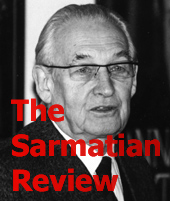| This Issue | Back Issues | Editorial Board | Contact Information |

Our Take: Central Europe Rides the Tiger
April 2003
Volume XXIII, No. 2
Until twelve years ago, non-Germanic Central Europe seemed forever confined to the margins of international politics. Poland, the Czech Republic, Hungary, and Slovakia were dominated by empires in the nineteenth century and they were swallowed by the Soviet empire in the twentieth. Twenty years of independence between the two world wars did not make much difference, so far as the international status of these countries was concerned.
After the fall of communism the United States became a major player in Central Europe, and was warmly welcomed there. Arguably, the initial decisions concerning the admission of these countries to NATO were taken on U.S. territory.
Now comes the specter of war with Iraq as promoted by the United States president to a reluctant opposition of the traditional continental European powers. What is the reaction of non-Germanic Central Europe? On January 23, 2003, Czech and Hungarian foreign ministers declared that it would be better to go to war against Iraqi President Saddam Hussein than risk him attacking another country. Both Czechs and Hungarians declared their readiness to support the United States in case of war. The Iraqi exiles are now trained on a Hungarian military base. During his visit to the United States on January 14, Polish President Aleksander Kwasniewski reiterated Polish support, and he confirmed his position in later statements. While announcing Polish Prime Minister Leszek Miller's visit to the White House on February 5, 2003, Ari Fleischer told reporters that "Poland is a close friend and ally of the United States" and the two leaders would discuss "key global and security issues."
On January 30, 2003, the three nations lined up behind the United States by signing an op-ed article (initiated by Spain and cosigned by representatives of Britain, Spain, Italy, Portugal, and Denmark) thanking the United States for "bravery and generosity" in ensuring the peace in Europe. Slovakia signed a day later.
Pointedly, non-Germanic Central Europe positioned itself apart from the Russians and from the Germans. Neither Russia nor Germany (nor France, for that matter) has ever done any favors to non-Germanic Central Europe, and there are no debts of gratitude to pay. On the other hand, it was American support that brought these countries into NATO.
Central Europe's support is not without value to the United States. The European heavyweights, Gemany and France, cautiously oppose the war while most of the world is decisively against it. In this situation, the voices of the formerly inconsequential states begin to weigh in. To have Central Europe on its side is an attractive card which President Bush's advisers Condolezza Rice and Colin Powell can play at their convenience, whereas Secretary of Defense Donald Rumsfeld has one of his problems solved by having Iraqi exiles trained in the heart of Europe.
Such support does not come without a price for the countries involved. Realpolitik has seldom been a pretty game, and entering it has usually involved a compromise of one's moral principles. The war with Iraq is not like King Jan Sobieski's rescue of Vienna in 1683, a defiantly anti-Realpolitik gesture motivated by Christian solidarity. Like the rest of the world, Poles are straddling the fence concerning the justness of the looming war. On February 15, 2003 in Rzeczpospolita, a respected Polish literary scholar and political commentator, Zdzislaw Najder, cautioned against the easy acceptance of American leadership in the matter. However, another political commentator, Jan Nowak-Jezioranski, pointed out that a split between Europe and the United States could have disastrous consequences for East Central Europe. America must remain a player in Europe, he declared.
The Poles have little room to maneuver. The Polish government has made its decision and, given the remarkable sympathy toward America in Poland, the Poles will likely concur. Ditto Czechs and Hungarians.
But the reluctance of France and Germany to support the United States made the leading Russian internet paper, Gazeta, gloat. On February 11, 2003, the leading headline read "Iraq destroyed NATO." The destruction of NATO has been Russia's long term goal. Russia will profit from the Iraq conflict. If oil supplies are interrupted and the price of oil skyrockets, Russia will rake in billions of dollars and will become an indispensable partner. If Iraq's oil fields survive, Russia will retain its oil interests there as well as the halo of having been antiwar. An additional bonus for Russia would be a possible weakening of NATO.
In Spring 2003, Central Europe entered Realpolitik from which it has been absent for three centuries. In our ahistorical age which relegates the First World War to prehistory, the immensity of change has not yet sunk in either in Central Europe or in America.
Back to the April 2003 Issue
The Sarmatian Review
sarmatia@rice.edu
Last updated 4/20/03